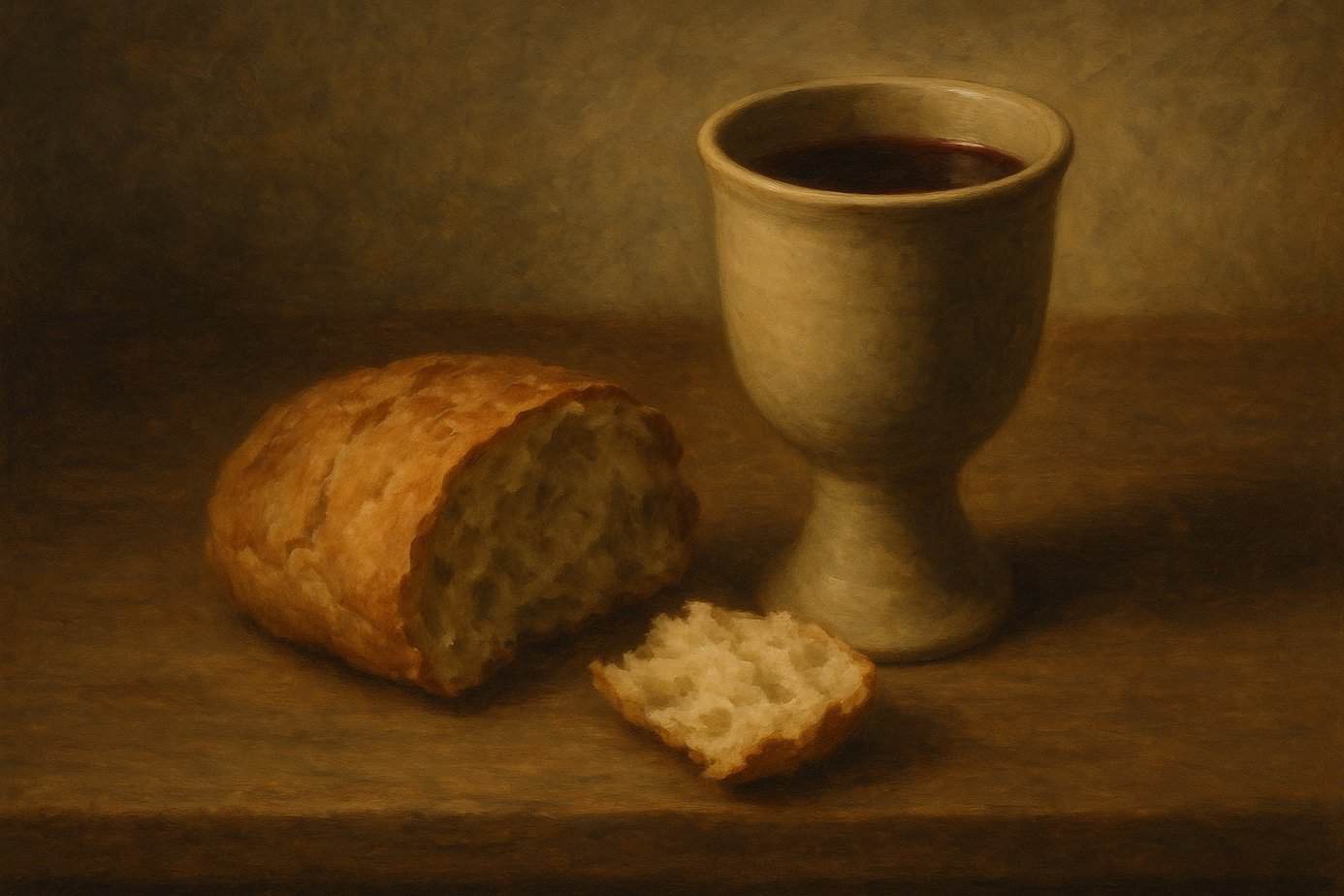If you’ve been in church long enough, you’ve probably noticed that the Lord’s Supper often carries a certain emotional weight. And not all of it comes from the beauty of remembering Christ’s death and resurrection. Many times, it comes from a pastor’s well-meaning warning that before we partake, we must “examine ourselves” so we don’t take the bread and cup “in an unworthy manner.” So let’s take a look at what it really means to take the Lord’s Supper unworthily.
Over the years I’ve heard dozens of sermons—good sermons, sincere sermons—where Communion became a quiet moment of inward searching, dredging up sins, and asking God to “clean us up” enough so we can safely take the elements. The tone isn’t usually harsh. These pastors are not trying to burden people. They genuinely want the church to honor the Lord’s Table. But somewhere along the way, the focus shifts away from Christ and slides subtly toward us: what we’ve done, what we haven’t done, what we’ve confessed, what we’ve forgotten to confess.
It becomes a moment of pressure.
A moment of fear.
A moment of wondering whether we’re “worthy” enough to participate.
And almost every time, it comes down to one verse in 1 Corinthians 11 where Paul tells believers to examine themselves.
For years I accepted that framing because it was all I ever heard. But the longer I’ve studied the context of that passage, the more convinced I’ve become that many of us have misunderstood what Paul was actually addressing. Not intentionally. Not rebelliously. Just traditionally. We’ve inherited a way of talking about the Lord’s Supper that doesn’t quite line up with what was happening in Corinth—and it has quietly changed how believers experience one of the most sacred and peace-giving ordinances Jesus left us.
What I want to do here is speak kindly, gently, and gratefully about pastors who mean well while still addressing something that genuinely matters. The Lord’s Supper was never meant to be a time where Christians tremble over their worthiness. It was never meant to be a moment of morbid introspection or anxiety. It was never meant to be a spiritual checkpoint where we clean ourselves up enough to participate.
The Lord’s Supper is a remembrance of Christ.
A celebration of His body broken for us.
A proclamation of His blood poured out for the forgiveness of sins.
A moment where we rest in His righteousness, not ours.
If we lose that focus—even with good intentions—we risk turning the Table into something Jesus never designed it to be.
1 Corinthians 11:27–32 (NIV)
27 So then, whoever eats the bread or drinks the cup of the Lord in an unworthy manner will be guilty of sinning against the body and blood of the Lord.
28 Everyone ought to examine themselves before they eat of the bread and drink from the cup.
29 For those who eat and drink without discerning the body of Christ eat and drink judgment on themselves.
30 That is why many among you are weak and sick, and a number of you have fallen asleep.
31 But if we were more discerning with regard to ourselves, we would not come under such judgment.
32 Nevertheless, when we are judged in this way by the Lord, we are being disciplined so that we will not be finally condemned with the world.

What Was Actually Happening in Corinth?
Let’s take a moment to step back into the world of 1 Corinthians 11. Paul wasn’t writing to a group of Christians who were failing to confess all their sins before communion. He wasn’t writing to believers who were struggling with various weaknesses and imperfections. He wasn’t writing to people who hadn’t “gotten right with God” before they took the bread and cup.
He was writing to a church behaving badly at the Lord’s Table.
Very badly.
The Corinthian problem was not unconfessed sin. It was blatant, outward disrespect of the gathering itself. When they met for the Lord’s Supper, it wasn’t the quiet, symbolic service we’re used to today. They shared a full communal meal. And during that meal, certain members were arriving early, eating most of the food, getting drunk, and leaving others—especially the poorer church members—hungry and humiliated.
Imagine walking into church for Communion Sunday and seeing a group huddled around the table, plates empty, cups drained, while others sat off to the side with nothing.
That’s what was happening.
That’s what Paul confronted.
They were:
- eating ahead of everyone else
- showing no regard for the poor
- treating the meal like a private feast
- drinking so much that drunkenness became part of the problem
- dividing the church instead of remembering Christ
In other words, they were making a mockery of the sacred event. Their behavior contradicted the very meaning of the Supper—they were proclaiming Christ’s sacrifice while simultaneously trampling on His people.
So when Paul says they were taking the Supper “in an unworthy manner,” he wasn’t talking about a believer who loves Jesus but had a rough week. He wasn’t addressing a Christian who lost his patience, or struggled with temptation, or wasn’t “all confessed up.” He wasn’t warning about a believer who hadn’t reached a spiritual level of holiness.
He was correcting outrageous, disrespectful, unloving behavior that distorted the Lord’s Supper into something selfish and dishonoring.
In other words:
Paul was addressing actions that openly contradicted the meaning of the meal.
Not a lack of internal perfection.
Examine Yourselves—But Examine What?
This is where the misunderstanding often happens. Paul does indeed say, “Let a man examine himself.” The phrase is right there in Scripture. The question is: what kind of examination did Paul have in mind?
Many sermons treat this as a command to scrutinize every corner of your heart. To go on a spiritual scavenger hunt for any unconfessed sin. To clean yourself up before you come to the Table. To make sure you’re “worthy enough”—a phrase that, ironically, contradicts the entire point of grace.
But that is not what Paul was talking about.
The examination Paul commands is an examination of how you are coming to the Table, not whether you’ve achieved a spotless level of inward holiness.
Are you approaching with reverence?
Are you recognizing the sacred meaning?
Are you treating your brothers and sisters with honor?
Are you coming in humility and gratitude, not selfishness and pride?
Self-examination is appropriate. But the goal isn’t purification.
It’s alignment.
Alignment with the meaning of the Supper.
Alignment with the sacrifice of Christ.
Alignment with the love He has shown us.
When we turn examination into anxious introspection, we unintentionally shift the spotlight away from Christ’s finished work and place it onto our performance.
That’s the problem.

What Makes Us Worthy? Only Christ.
Here’s the heart of it:
If the Lord’s Supper required personal worthiness, none of us would ever qualify.
Not the preacher.
Not the elder.
Not the missionary.
Not the faithful saint who has walked with God for decades.
We don’t come to the Table because we are worthy.
We come because He is worthy.
We don’t come because we’ve cleaned ourselves up.
We come because He has cleansed us by His blood.
We don’t come because we have stamped out sin in every corner of our lives.
We come because He paid for our sin at the cross.
Our righteousness is not our contribution.
It is His gift.
When we approach the Table with fear that some hidden or forgotten sin will make us “unworthy,” we have missed the very joy of what the Supper proclaims. The bread and the cup do not call us to achieve a level of spiritual cleanliness. They remind us that Jesus achieved it for us.
Communion is not a place to earn acceptance.
It’s a place to celebrate it.
When Communion Becomes About Us Instead of Christ
Most pastors who emphasize deep introspection during the Lord’s Supper are not trying to burden believers. They genuinely want to shepherd faithfully. They want the church to honor Christ. They want believers to take sin seriously.
The intention is good.
But intention doesn’t erase impact.
When Communion becomes a time where believers worry about whether they’ve confessed enough, repented enough, or “gotten right with God” enough, the Table becomes a place of pressure instead of peace.
It becomes a moment of anxiety instead of remembrance.
And ironically, the more we focus on ourselves, the less we focus on Christ.
Imagine being invited to a banquet to honor someone you love deeply. But when you arrive, the host tells you to look inward and evaluate whether you’re worthy to attend. Would that honor the one being celebrated? Or would it pull everyone’s attention in the wrong direction?
Christ did not give us the Supper to turn us inward.
He gave it to point us outward—to His sacrifice, His grace, His love, His victory.
If we are not careful, well-meaning warnings can overshadow the very thing Jesus wanted us to remember.
Yes, There Is a Right Way to Come to the Table
Let’s be clear: none of this means that attitude doesn’t matter.
Reverence matters.
Gratitude matters.
Humility matters.
Love for the body of Christ matters.
So, examine yourself.
But examine whether your heart is focused on Christ.
Examine whether your attitude reflects the meaning of the Supper.
Examine whether you’re remembering Him, not yourself.
There is nothing wrong with pausing to check your heart.
However, if we wait until we have all of the sin out of our lives we won’t every participate in the Lord’s Supper.
That is the difference.
The Lord’s Supper Is a Gift—Not a Test
One of the most heartbreaking consequences of the traditional “clean yourself up first” approach is that believers sometimes feel hesitant, fearful, or unworthy to come forward. They love Jesus. They want to remember His sacrifice. But they feel pressure to reach a level of spiritual fitness before they dare take the bread and cup.
If that is the effect of our teaching, then something has gone wrong.
Jesus did not break His body and pour out His blood so we would wonder whether we’re worthy enough to remember it. He gave us the Supper so we would rest in His finished work.
Communion is not a test you take.
It is a grace you receive.
It is not a moment of achieving.
It is a moment of remembering.
It is not about your righteousness.
It is about His righteousness imputed to you.
And that is why the Supper is one of the most peace-giving, beautiful acts of worship we have. When the focus is on Christ, not on our worthiness, the Lord’s Table becomes a place of rest, not fear; joy, not anxiety; remembrance, not performance.
Conclusion
The Lord’s Supper is sacred. It is holy. It is precious. And it is Christ-centered from beginning to end. When we turn the Table into a place of personal purification, we unintentionally overshadow the very grace it proclaims. Paul’s correction to the Corinthians was severe because their behavior contradicted the meaning of the meal. We certainly don’t want to take the Lord’s Supper unworthily. But his words were never intended to intimidate believers who love Jesus and desire to honor Him.
We are worthy to come because Christ has made us worthy.
We are invited because He has redeemed us.
We are welcome because His blood has already cleansed us.
If there is any examination we need before Communion, it is simply this:
“Is my heart remembering Him? Am I approaching this in gratitude for His sacrifice?”
When we keep the focus where Jesus placed it—on His body and His blood—the Lord’s Supper becomes again what He intended: a remembrance of grace, a proclamation of His death, and a celebration of the salvation He purchased for us.





Leave a Reply